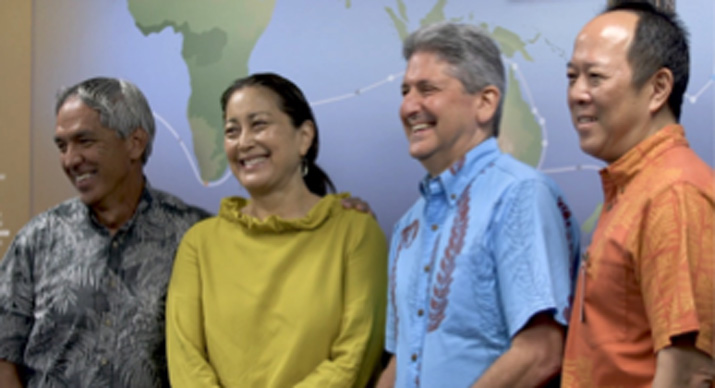
ʻAha Moananuiākea Consortium Overview
ʻAha Moananuiākea Pacific Consortium Overview: Developing Hawaiian Leaders for the Pacific World
[Downloadable pdf]
While in-person gatherings and exchanges have been put on hold as communities around the globe remain mindful of the COVID-19 pandemic, a robust network of cultural collaborations continues to thrive throughout the Pacific.
For the first time in its history, Kamehameha Schools has created and continues to build a Pacific network of indigenous partnerships that promotes ancestral knowledge and worldview to help shape local and global solutions through cultural, educational, and professional exchanges.
ʻAha Moananuiākea Pacific Consortium encompasses Kamehameha Schools, Polynesian Voyaging Society (PVS), Bishop Museum, and the University of Hawaiʻi System, and is led and organized by KS’ Hoʻokahua Cultural Vibrancy Group. Based at the Kaʻiwakīloumoku Hawaiian Cultural Center, an emerging Pacific indigenous institute on the KS Kapālama campus, the consortium’s purpose is to honor the ancestral oceanic home of Native Hawaiians – Moananuiākea – where profound human achievements have taken place for millennia.
An executive leadership team of KS CEO Jack Wong, PVS President Nainoa Thompson, Bishop Museum President and CEO Melanie Ide, and UH President David Lassner has collaborated to reclaim and reframe the largest body of water on earth as a critical educational setting for ʻōiwi leadership and the exploration of real-world solutions to global issues. The underlying strategy is to cultivate and sustain long-term cultural relationships that foster knowledge sharing, educational exchange and professional interface throughout the greater Pacific community, in which we serve as leaders, citizens, and lifelong learners.
While new for the Kamehameha Schools of today, the work of ʻAha Moananuiākea is inspired by the visionary efforts of many Native Hawaiian leaders whose historic legacies we proudly bear. Kamehameha ʻEkahi, the consummate strategist and diplomat, was astute at negotiating with foreign parties. Kalākaua, while ratifying treaties and pursuing international relations, envisioned alliances throughout Oceania and tried to establish a Polynesian Confederation. Ke Aliʻi Pauahi was keenly aware that she was founding KS at a time when Hawaiʻi was arguably the most internationally engaged island society in the Pacific. Today, Polynesian voyaging canoe Hōkūleʻa has applied our ancestral navigational sciences to circumnavigate the earth and rally together people from all continents to act with urgency to address our planet’s environmental plight.
Five distinguished departed elders provide inspiration and ancestral guidance for the consortium: Myron “Pinky” Thompson (Hawaiian leader, KS trustee, and PVS president); Mau Piailug (senior master navigator from Satawal, Federated States of Micronesia); Sir Hector Hekenukumai Busby (Māori master navigator and canoe builder from Aotearoa); Alban Ellacott (Tahitian civic leader, promoter of traditional voyaging, and president of Tainui Friends of Hōkūleʻa from French Polynesia); and Byron Mallott (Sealaska Corporation Chair and CEO, and leader of the Tlingit Raven Kwáashk’i Kwáan Clan of Yakutat, Alaska).
Imagine these virtual and in-person exchanges: Tahitian, indigenous Taiwanese, and Tlingit students being hosted by our haumāna and engaging in scientific research to regenerate coral and reef ecosystems; aspiring Hawaiian lawyers rubbing shoulders with Māori judges from the Waitangi Tribunal, while exploring self-determination issues; a Pacific symposium featuring elders from Taputapuātea Marae discussing traditional ceremonies and their recent designation as a UNESCO World Heritage Site; and land and water managers from Hawaiʻi and Rapa Nui exchanging ancestral knowledge and indigenous innovations for environmental restoration and stewardship. While these exchanges are currently taking place on a digital platform, plans are underway to offer in-person exchanges as soon as public health conditions permit. Not only do these opportunities take our community out into the world, they bring the world, especially the greater Pacific, here to our Hawaiʻi home; the opportunities are endless.
At this juncture in human history, climate change, sea level rise, and the threat to our oceans are curricular imperatives for education, and native peoples have important knowledge and insight that can lift humanity and help make the world whole. This is what makes relationship building and cultural exchange so vital to education: we empower native voices, strengthen cultural practices and worldview, elicit critical dialogue and generate real-world solutions guided by ancestral wisdom.
Since its inception in 2018, ʻAha Moananuiākea has developed formal declarations, which have been signed by consortium partners across the Pacific to establish 10 partnerships to date, with two more poised for 2021.
ʻAha Moananuiākea Consortium Partners

Kamehameha Schools, a private school system and charitable educational trust founded by Princess Bernice Pauahi Bishop in 1884, is dedicated to advancing the condition of Native Hawaiians and developing a thriving Lāhui through education. Livingston “Jack” Wong, Chief Executive Officer.
Polynesian Voyaging Society (PVS), a non-profit research and educational corporation founded in 1973, is dedicated to perpetuating traditional navigation and voyaging, restoring and revitalizing the Pacific, and promoting a sustainable Island Earth. Nainoa Thompson, President.
Bishop Museum, the premier natural and cultural history institution in the Pacific was founded in 1889 by Charles Reed Bishop in honor of his late wife, Princess Bernice Pauahi Bishop. It has a distinguished history of scientific and ethnographic research and is the world’s leading repository for Hawaiian and Pacific treasures. Melanie Y. Ide, President and Chief Executive Officer.
University of Hawaiʻi System has served as Hawaiʻi’s public system of higher education since 1907. Its three universities, seven community colleges, and multiple community learning centers are dedicated to meeting the diverse educational needs of Hawaiʻi’s multi-ethnic community. The UH System honors the foundational role of Hawaiʻi’s host culture, and its commitment as an indigenous-serving institution. Dr. David Lassner, President.
